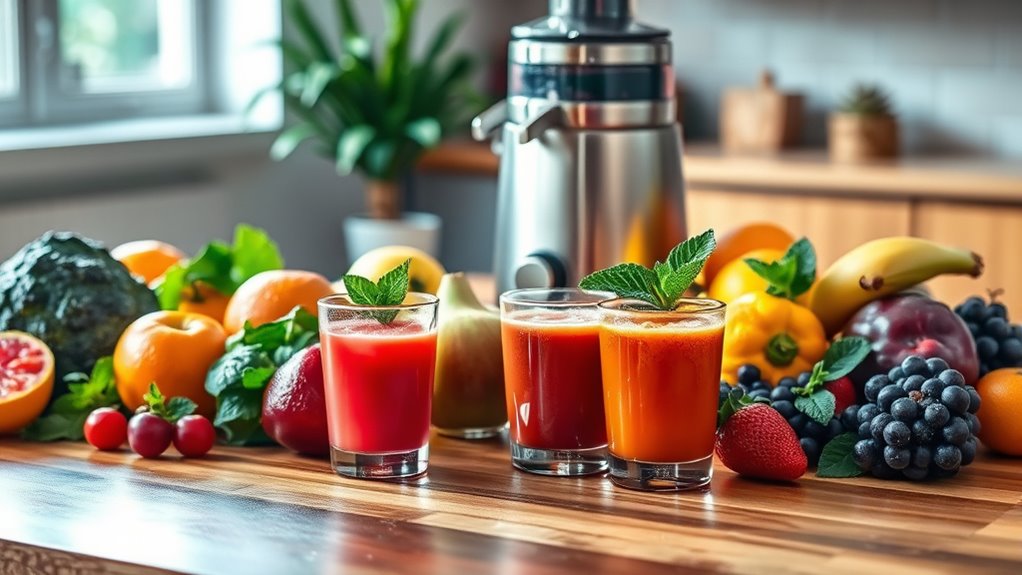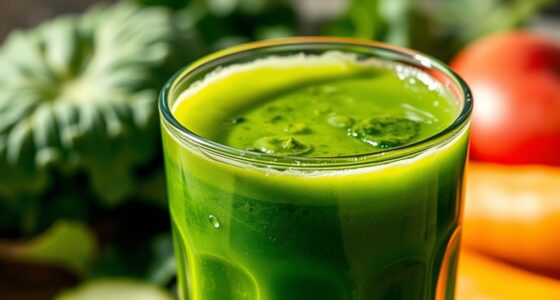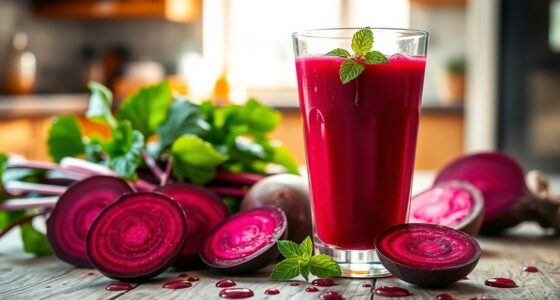Juicing can enhance your digestive health by providing concentrated vitamins and minerals that boost beneficial gut bacteria. It gives your digestive system a break from fiber digestion, promoting gut health. However, it’s important to balance juices with whole foods to avoid nutrient imbalances and excessive sugar intake. Mixing fruits and veggies can create delicious combinations, while incorporating digestive aids like ginger can help too. Discover more ways to maximize the benefits of juicing!
Key Takeaways
- Juicing provides concentrated vitamins and minerals that can support beneficial gut bacteria and improve overall gut health.
- Certain juices, like green juice and apple juice, can aid in digestive processes and promote regular bowel movements.
- Freshly squeezed juices can offer a temporary break from fiber digestion for individuals with specific health conditions.
- Balancing juices with whole fruits and vegetables ensures adequate fiber intake, essential for digestive health and preventing constipation.
- Adding digestive aids like ginger or lemon to juices can enhance digestion and reduce inflammation in the gut.
Understanding the Basics of Juicing
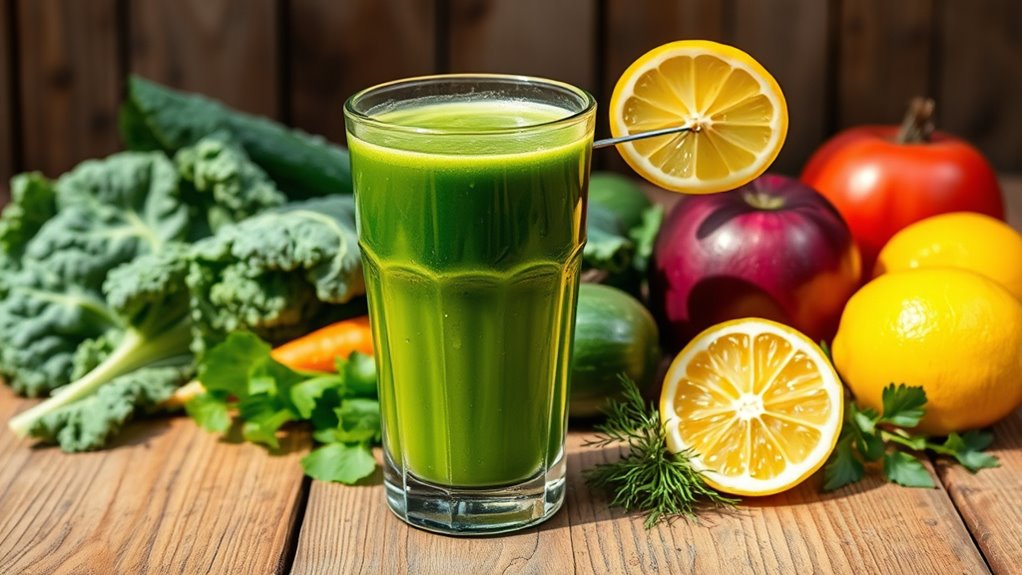
Juicing is a vibrant way to boost your nutrient intake by extracting juice from fresh fruits and vegetables. This method gained popularity in the 1920s and 1930s and became mainstream in the 1970s.
By juicing, you can quickly access essential vitamins and minerals, making it easier to incorporate more nutrients into your diet, especially if you struggle to consume whole foods. However, remember that while juice provides a concentrated source of nutrients, it lacks fiber, which is vital for digestive health. Additionally, a juice cleanse can enhance digestive health by providing a concentrated source of vitamins and antioxidants that support overall wellness.
To maintain balance, pair your juice with whole fruits and vegetables. Freshly made juice should be consumed immediately to maximize nutrient retention and prevent bacterial growth, ensuring you get the most out of your vibrant juice creations.
Nutritional Content of Juices vs. Whole Foods

When comparing the nutritional content of juices and whole foods, it’s important to recognize the significant differences in what each offers.
While juices can provide a concentrated dose of vitamins and minerals, they lack the fiber found in whole fruits and vegetables, essential for your digestive system and gut health. This absence can lead to constipation if not compensated for in your diet.
Juices may offer vitamins, but they miss the crucial fiber that supports digestion and gut health.
Whole produce has a lower glycemic index, helping to regulate blood sugar levels, whereas juices often contain high sugar concentrations that can cause spikes.
The USDA recommends that at least half of your fruit intake comes from whole fruits to guarantee adequate fiber consumption and better overall health outcomes. Additionally, unique homemade fruit juice recipes can provide a tasty alternative while still prioritizing whole fruits in your diet.
Choose wisely for your digestive well-being!
The Role of Fiber in Digestive Health
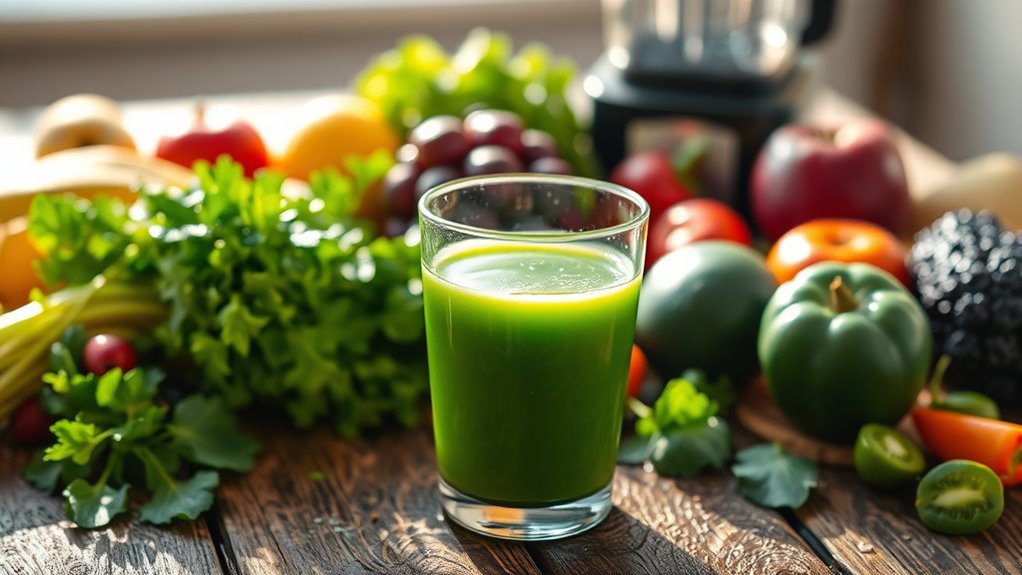
Fiber plays an essential role in maintaining digestive health, as it not only regulates bowel movements but also helps prevent constipation by adding bulk to your stool. A high-fiber diet lowers your risk of developing digestive disorders like diverticulitis and colorectal cancer.
Soluble fiber absorbs water, forming a gel-like substance in your gut that can slow digestion, improving nutrient absorption. Meanwhile, insoluble fiber promotes the movement of food through your digestive tract, supporting a healthy gut microbiome by fostering beneficial bacteria.
The USDA recommends that half of your fruit intake come from whole fruits, highlighting the importance of fiber over juicing, which removes most of this crucial nutrient. Prioritize whole fruits to nourish your digestive health effectively. Additionally, incorporating exotic fruit blends into your diet can enhance both flavor and nutritional value, offering a delicious way to enjoy fiber-rich whole fruits.
Potential Benefits of Juicing for Gut Health
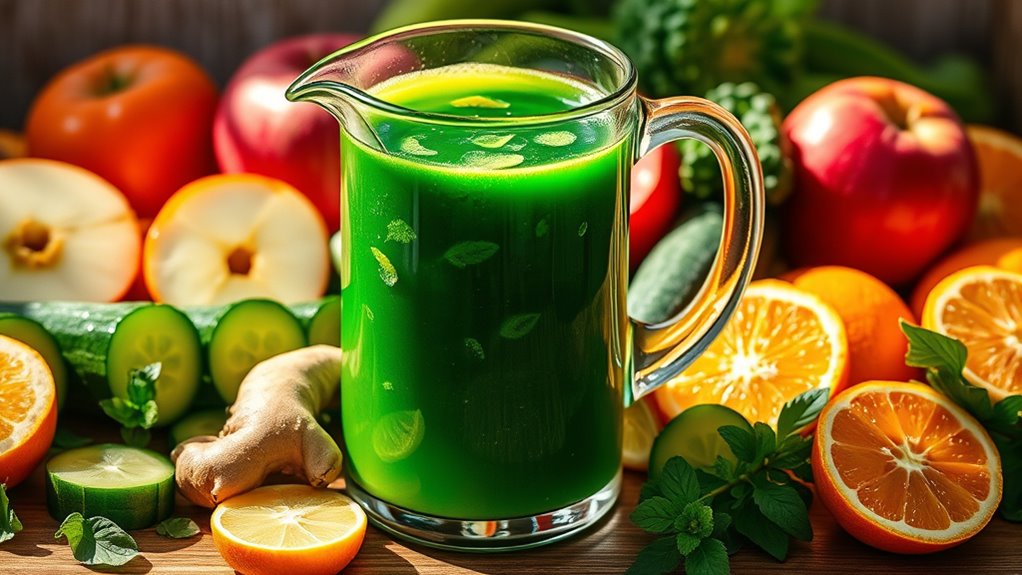
While incorporating fresh juices into your diet can be a delicious way to boost your nutrient intake, it’s essential to understand how they can positively impact gut health.
Juices can support digestive health by providing concentrated vitamins and minerals and promoting beneficial gut microbiota. Here are a few ways juices can enhance your gut health:
- Encourage beneficial bacteria: Juices like red cabbage can increase favorable gut bacteria and reduce inflammation.
- Aid digestion: Green juice and apple juice contain compounds that support digestive processes.
- Ease digestive strain: Juicing offers a break from fiber digestion for those with specific health conditions. Additionally, juices like lemon juice can aid in digestion and boost liver function, further supporting overall gut health.
Risks and Downsides of Juicing
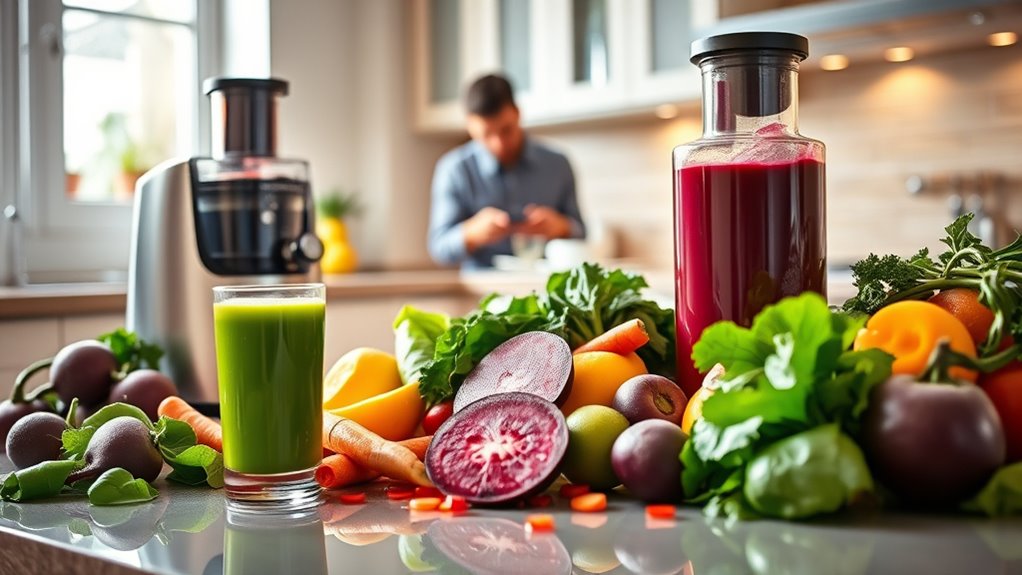
While juicing can seem like a healthy choice, it comes with significant risks you should consider.
The excessive sugar content and lack of fiber can lead to nutritional imbalances and negatively affect your digestive health.
If you rely too heavily on juice, you might find yourself missing out on essential nutrients your body needs. Additionally, incorporating chia seeds into your diet can provide beneficial fiber that promotes bowel regularity and enhances overall digestive health.
Excessive Sugar Intake
Juicing can seem like a healthy choice, but it often leads to excessive sugar intake that may harm your digestive health. Instead of being healthier than eating whole fruits, juices can spike your blood sugar levels and cause crashes. Here are a few risks to evaluate:
- Many fruit juices contain as much sugar as soda, boosting calorie intake.
- Juicing lacks fiber, worsening insulin responses and increasing metabolic disorder risks.
- High-sugar juices can promote harmful bacteria growth in your gut.
The USDA advises that at least half of your fruit intake should come from whole fruits, not juices. By choosing whole fruits, you’ll support your digestive health while avoiding the pitfalls of excessive sugar consumption.
Fiber Deficiency Concerns
When you opt for juicing over whole fruits, you may be missing out on essential fiber that supports digestive health.
Fiber deficiency concerns arise when relying too much on juice, as it removes most of the beneficial fiber found in fruits and vegetables. This lack can lead to feelings of hunger and may contribute to malnutrition, making it hard to maintain a healthy diet.
Additionally, the high sugar content in juice can lead to blood sugar spikes, which might fuel harmful bacteria in your gut. Consuming juice exclusively can hinder your digestive health, as it doesn’t provide the nutrition needed for a balanced diet rich in fiber.
Aim to include whole fruits in your routine to guarantee adequate fiber intake.
Nutritional Imbalance Risks
Opting for juice instead of whole fruits and vegetables can lead to significant nutritional imbalances. While juicing may seem healthy, it removes essential dietary fiber and can cause malnutrition over time.
Here are some risks you should know:
- High sugar content in juices can spike blood sugar levels, leading to metabolic issues.
- Juicing lacks the protein and nutrients found in whole fruits, increasing the risk of malnutrition.
- Juice cleanses may result in temporary weight loss, but you’ll likely regain it once you return to regular eating.
It’s vital to remember that whole fruits and vegetables provide extensive health benefits that juices simply can’t match. Additionally, consuming low carb foods can help maintain stable blood sugar levels and support overall metabolic health.
Prioritize balanced nutrition for ideal digestive health and overall well-being.
Comparing Juicing and Blending for Nutrient Retention
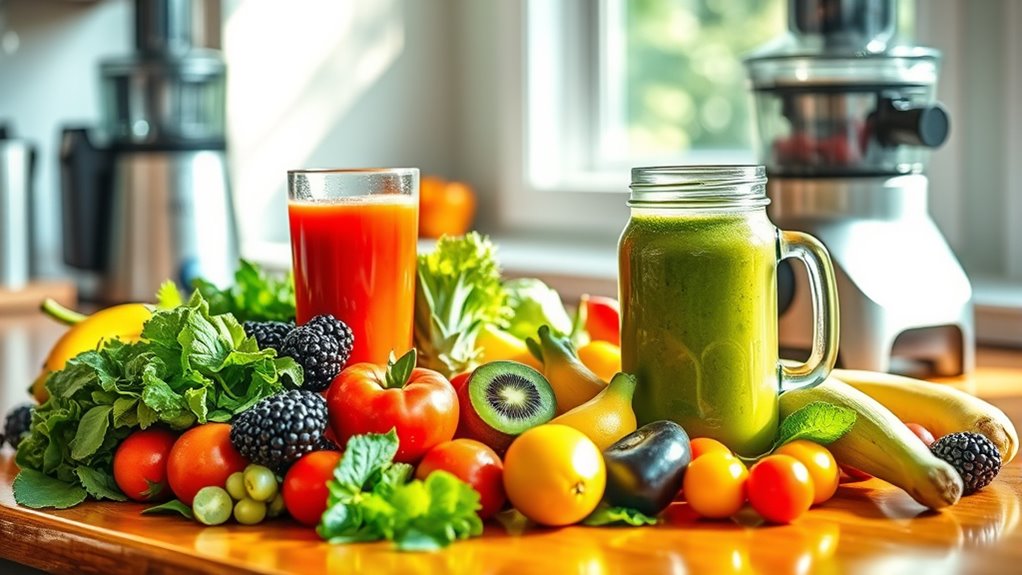
How do juicing and blending stack up when it comes to retaining nutrients? Juicing separates liquid from pulp, creating a drink that’s low in fiber but packed with concentrated vitamins and minerals.
In contrast, blending retains the fiber, promoting a more balanced nutrient profile. Studies show that blended smoothies often contain higher phytonutrients, benefiting your gut health.
Since juicing can lead to higher sugar levels, blending whole fruits helps regulate sugar intake. Fiber is essential for digestive health, and juicing strips it away, which can harm your gut microbiota. Additionally, whole fruits provide more vitamins and minerals than juices, supporting overall health outcomes.
Recommendations for Incorporating Juicing Into Your Diet
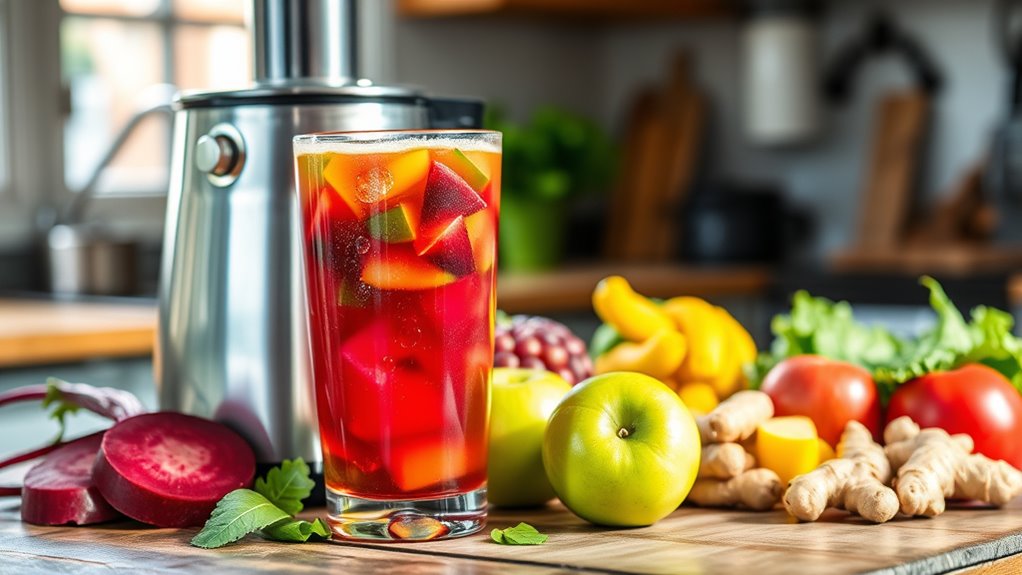
When you start incorporating juicing into your diet, think about mixing different fruits and vegetables for a nutrient boost.
It’s important to balance your juices with whole foods to maintain digestive health.
Experiment with flavors and combinations to keep your diet interesting while reaping the benefits of juicing. Additionally, consider adding freshly squeezed juice to your routine, as it retains more nutrients than processed options.
Juicing Variety Suggestions
Incorporating a variety of fruits and vegetables into your juices can greatly boost your nutrient intake and support digestive health.
Here are some suggestions to enhance your juicing experience:
- Leafy greens: Combine kale, spinach, or Swiss chard for a nutrient-dense base.
- Fresh fruits: Use apples, oranges, or berries for a natural sweetness that benefits gut bacteria.
- Digestive aids: Add ginger or lemon to enhance digestion and provide anti-inflammatory benefits.
Incorporating seeds like chia can also add omega-3 content and fiber, further supporting digestive health.
Balanced Diet Integration
While juicing can be a great way to boost your nutrient intake, it’s important to integrate it wisely into your overall diet.
To maximize health benefits, consider blending fruits and vegetables instead of just juicing. This way, you retain fiber and keep more nutrients intact. Limit your consumption of fresh juice to moderate amounts, ensuring at least half of your fruit intake comes from whole fruits, as the USDA recommends.
Use freshly made juices immediately to avoid nutrient loss and bacterial growth. A balanced diet rich in fiber is key, so incorporate your juices made from whole foods alongside other nutritious options. Additionally, remember that juices can provide essential nutrients while helping to reduce calorie intake.
Finally, consult a healthcare professional to tailor your juicing practices to your health needs.
Exploring Natural Juices for Gut Health Support
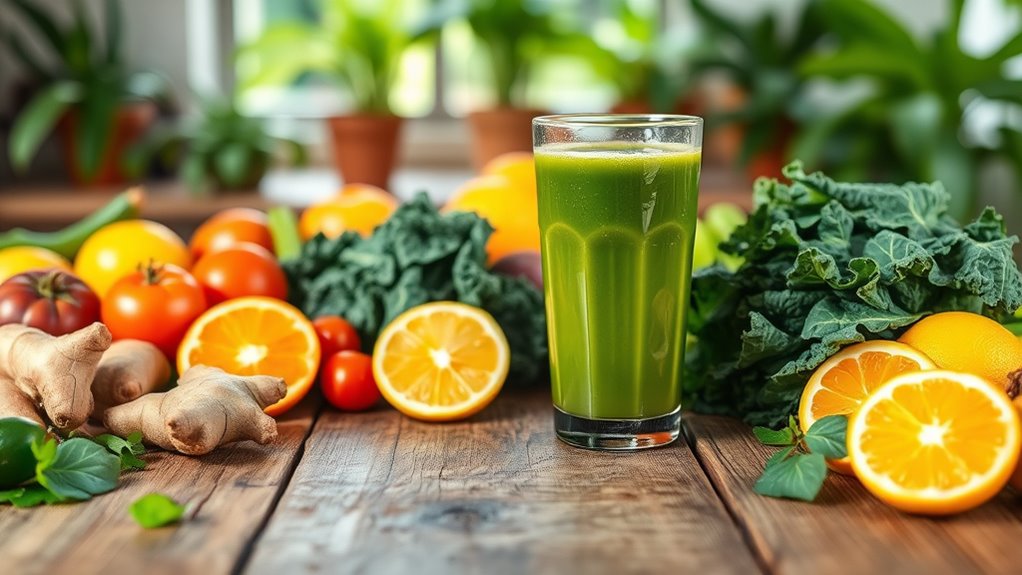
How can natural juices enhance your gut health? Incorporating juices into your diet can markedly support digestive health and promote a balanced gut microbiota. Here are some key benefits:
- Nutrient absorption: Juices like lemon can boost bile production, aiding in nutrient absorption.
- Anti-inflammatory ingredients: Juicing with ginger can soothe your stomach and reduce discomfort.
- Whole foods integration: Juices like red cabbage can modulate gut microbiota and help with inflammation.
When you combine juicing with a balanced diet rich in whole foods, you’ll optimize your digestive health.
Natural juices provide essential vitamins and minerals that complement your overall well-being, making them a great addition to your routine. Embrace the power of natural juices for a healthier gut!
Frequently Asked Questions
What Is the 80/20 Rule for Juicing?
The 80/20 rule for juicing suggests you should get 80% of your diet from whole, fiber-rich foods, while allowing 20% for juice.
This balance helps you maintain adequate fiber intake, essential for digestive health. It lets you enjoy the vitamins and minerals from juices without overdoing the sugar.
Is There Any Science Behind Juicing?
Yes, there’s science behind juicing! Research shows that juices, like red cabbage juice, contain bioactive compounds that can positively impact your gut health.
They can alter gut microbiota and boost beneficial bacteria, enhancing short-chain fatty acid production that reduces inflammation. This natural approach offers potential therapeutic benefits for conditions like inflammatory bowel disease.
Just remember, while juicing provides concentrated nutrients, it’s important to include whole foods for fiber and overall digestive health.
What Happens to Your Body After 3 Days of Juicing?
After just three days of juicing, you might find that your gut bacteria shift in surprising ways.
Studies show that juice-only diets can increase inflammation-related bacteria while decreasing beneficial ones. Without dietary fiber, you may face digestive issues and a less healthy microbiome.
Plus, the high sugar content in juices can spike your blood sugar, potentially feeding harmful bacteria.
Blending fruits and veggies might be a better option for your gut health overall.
What Are 5 Cons of Juicing?
When you consider juicing, you’ll find several drawbacks.
First, it removes essential fiber, which is vital for digestion.
Second, many juices are high in sugar, leading to blood sugar spikes.
Third, juicing can be expensive since you need a lot of produce for a little juice.
Fourth, the lack of fiber and protein might result in malnutrition over time.
Finally, relying solely on juice can disrupt your gut microbiome’s health.
Conclusion
Incorporating juicing into your diet can be like planting seeds in a garden; with the right care, your digestive health can flourish. While juices offer a concentrated burst of nutrients, it’s essential to balance them with whole foods for fiber. Embrace the potential benefits of juicing but remain mindful of its drawbacks. By choosing natural juices and maintaining a varied diet, you’re nurturing your gut and setting the stage for a vibrant, healthy life.
Cindy thoroughly researches juicing trends, techniques, and recipes to provide readers with practical advice and inspiration. Her writing style is accessible, engaging, and designed to make complex concepts easy to understand. Cindy’s dedication to promoting the advantages of juicing shines through her work, empowering readers to make positive changes in their lives through the simple act of juicing.

